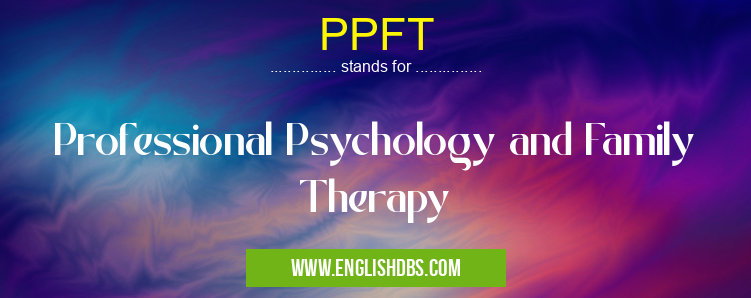What does PPFT mean in PSYCHOLOGY
PPFT stands for Professional Psychology and Family Therapy. It is a specialized field within psychology that focuses on the interplay between individual mental health and family dynamics. PPFT practitioners aim to improve the well-being of both individuals and their families through comprehensive interventions.

PPFT meaning in Psychology in Academic & Science
PPFT mostly used in an acronym Psychology in Category Academic & Science that means Professional Psychology and Family Therapy
Shorthand: PPFT,
Full Form: Professional Psychology and Family Therapy
For more information of "Professional Psychology and Family Therapy", see the section below.
Meaning in SCIENCE
PPFT draws upon principles from psychology, family therapy, and systems theory. It recognizes that individuals function within a complex network of relationships, and that their mental health is influenced by the interactions and dynamics within their family system. PPFT practitioners use evidence-based techniques to address both individual and family-level issues.
Key Features
- Focus on both individual and family perspectives
- Holistic approach that considers the biopsychosocial aspects of mental health
- Use of systems theory to understand family dynamics
- Emphasis on communication, conflict resolution, and relationship enhancement
- Tailored interventions based on individual and family needs
Applications
PPFT is commonly used to address a wide range of mental health issues, including:
- Anxiety disorders
- Depression
- Relationship problems
- Trauma and abuse
- Substance use disorders
- Eating disorders
Benefits
- Improved individual and family mental health
- Enhanced communication and problem-solving skills
- Increased resilience and coping mechanisms
- Reduced symptoms of mental illness
- Strengthened family bonds
Essential Questions and Answers on Professional Psychology and Family Therapy in "SCIENCE»PSYCHOLOGY"
What is Professional Psychology and Family Therapy (PPFT)?
PPFT is an interdisciplinary field that combines the principles of psychology and family therapy to address the mental health and well-being of individuals within the context of their family and social relationships. It aims to promote healthy family functioning, enhance communication, resolve conflicts, and support individuals in navigating life challenges.
How does PPFT differ from traditional psychology or family therapy?
PPFT takes a holistic approach that emphasizes the interconnectedness of the individual and their family system. It recognizes that family dynamics can significantly influence an individual's mental health and that interventions should address both the individual and the family as a whole.
What types of issues does PPFT address?
PPFT can address a wide range of mental health and relationship challenges, including:
- Communication and conflict resolution
- Trauma and abuse
- Depression and anxiety
- Substance use
- Relationship issues
- Parenting challenges
What are the benefits of PPFT?
PPFT offers several benefits, including:
- Improved communication and understanding within families
- Enhanced conflict resolution skills
- Reduced symptoms of depression, anxiety, and other mental health issues
- Increased family cohesion and support
- Improved parenting skills
Who can benefit from PPFT?
PPFT is suitable for individuals, couples, and families of all ages and backgrounds who are experiencing difficulties in their relationships or mental health. It can be particularly beneficial for families facing challenges such as:
- Divorce or separation
- Blended families
- Child behavioral problems
- Grief and loss
Final Words: PPFT is a specialized field that integrates psychology and family therapy to promote the mental health of individuals and their families. By addressing both individual and family-level factors, PPFT practitioners help to create healthier relationships, improve communication, and foster resilience. It is an effective approach for a wide range of mental health issues, offering significant benefits to individuals and their families.
